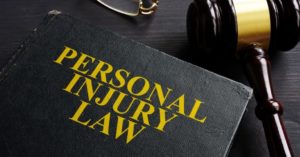
The legal aftermath of a car accident can be complex. Strictly speaking, you do not have to seek help from a personal injury attorney. Practically speaking, however, the odds of securing full and fair compensation for your injuries and losses from the at-fault party increase significantly if you do.
An attorney can help you by gathering evidence, investigating the law, negotiating with insurers, filing a lawsuit, arguing on your behalf in court, and helping you avoid pitfalls along the way. Further, our free initial consultations mean there is little downside to having one of our attorneys evaluate your case. Call Truitt Law Offices today to make sure you get started on the right foot down the road toward maximum compensation.
Table of Contents
What Does a Personal Injury Attorney Do?
All attorneys are obligated to pursue and protect the best interests of their clients. In a personal injury case, this means helping clients secure the financial compensation they are entitled to for their injuries and losses, either at the negotiation table with the at-fault party or in court. It also means using their legal training and experience to avoid the many obstacles along the way.
-
Make Sure You Know Your Rights and Options
Among the primary responsibilities of any lawyer is to make sure their clients are well informed about their legal rights and options. There is a reason lawyers are sometimes referred to as “legal counsel.” Ultimately, clients have the final say about things like accepting a settlement offer or taking their case to trial. However, attorneys are responsible for making sure they can make an informed decision.
-
Investigate the Law and Evidence in Your Case
Of course, your lawyer will use their legal training and experience to investigate the governing law, as well the terms of any controlling insurance policies. They will then gather evidence to build your case, including things like police accident reports, footage from the scene, witness statements, and medical treatment/billing records. All of this will be used to prove fault and the extent of your losses, which will then be used to calculate the amount of compensation you deserve.
-
Negotiate an Insurance Settlement
Most personal injury cases never reach court. Instead, they are resolved in out-of-court settlement negotiations with the at-fault driver and their insurers. Of course, the other side wants to pay as little money as possible. Therefore, during settlement negotiations, they will try their hardest to minimize the extent and severity of your injuries. Your attorney’s job is to push back using the information gathered in step two.
-
Prepare Your Case for Court
Though most cases never reach trial, some do. Going to court is a big decision. Because it can be costly and time-consuming, only cases with a good chance of securing a significant judgment will get this far.
Ultimately, each client makes the decision for themselves, but their attorney should make sure they have a good grasp of what is at stake. If you decide to go, your attorney will guide your case through the highly formal process and argue on your behalf before a judge and/or jury.
-
Help You Avoid Making Easy Mistakes
The road toward compensation is full of challenges. Your attorney will be your closest ally and help you navigate the winding path. Among other things, they will help protect you against unscrupulous insurance companies.
Unlike your attorney, insurance companies will always put their bottom line before your best interests. Do not make the mistake of trusting them. If an insurance company adjuster calls before you secure representation, do not (1) admit fault, (2) provide a recorded statement, (3) sign a medical record release, or (4) accept their first settlement offer.

What Compensation is Available in a Personal Injury Lawsuit?
If you were injured in an auto accident at little to no fault of your own, you might be entitled to a wide range of compensation from the at-fault party. In most personal injury cases, compensation comes in the form of economic and non-economic damages, collectively known as compensatory damages. In rarer cases involving extremely irresponsible behavior from the at-fault party, you may also be entitled to punitive damages.
-
Economic Damages
As the name suggests, economic damages are meant to compensate for losses that can be easily translated into dollars and cents. This form of damages is calculated by simply adding up things like medical bills, lost wages, repair estimates, and replacement costs. However, in the event your injuries leave you will permanent or long-term disabilities, things may get a bit trickier when calculating the value of your lowered earning capacity.
-
Non-economic Damages
By contrast, non-economic damages are meant to compensate for intangible losses that do not boil down as easily to a fixed price tag due to their more subjective nature. This category includes things like pain, suffering, emotional distress, lowered quality of life, and loss of consortium.
Non-economic damages should not be underestimated, as they can significantly raise the total compensation you receive in your case. However, because each individual is likely to place a different value on these kinds of losses, it is very important to have a compassionate attorney who understands the true extent of your loss and who can compellingly communicate it to a jury.
Notably, though many states place a limit on the amount of non-economic damages injury victims may receive, Indiana generally does not. An exception exists when your case is brought against the state.
-
Punitive Damages
Finally, punitive damages may be available in cases involving extremely irresponsible or otherwise reprehensible behavior. This form of damages is not awarded as compensation but rather as punishment for the at-fault party. Courts are normally reluctant to allow punitive damages due to their severe nature. When awarded, they are capped at three times the amount of your compensatory damages or at $50,000, whichever is higher.
When Should I Speak to a Personal Injury Attorney?
Personal injury cases are governed by a law known as the statute of limitations, which sets a deadline after which you may no longer file your case in court seeking compensation from the at-fault party. In Indiana, the deadline is set at two years after the date of the accident. There are several reasons missing this deadline can seriously compromise your case.
First, the longer you wait after an accident, the more time there is for evidence to deteriorate or disappear, as well as for witnesses’ memories to fade. Second, failure to file your case before the deadline passes nearly always results in your case being dismissed in court. Third, losing the ability to sue in court will simultaneously destroy your bargaining power when negotiating an out-of-court settlement with the at-fault party and their insurers.
The best way to avoid all three consequences is simply by having an experienced attorney review your case as soon as possible after your car accident. Our legal team is ready to evaluate and handle your case from start to finish. Call us today.
Speak to an Experienced Car Accident Lawyer
In closing, consulting with a personal injury attorney is not strictly required after being injured in an accident. That said, doing so will help ensure that you are well-informed about your rights and avoid costly mistakes on the road to full and fair compensation for your injuries.
At Truitt Law Offices, we have over 40 years of experience representing car accident victims throughout Indiana. We have the skill and resources to help you too. Call us today for a free consultation with an experienced personal injury attorney near you. You pay nothing unless we win your case.








